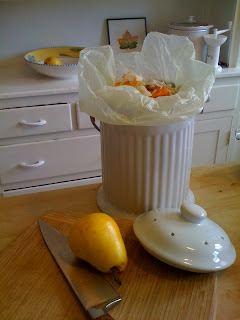Recycling basket and kitchen waste bin
© L. Kathryn Grace
How is it possible that a two-person household can generate nearly 20 gallons of waste every week? I'm declaring a War on Garbage.© L. Kathryn Grace
It's not like we haven't been conscious of the crud stuffing our can and recycling basket. After all, way back in 1972, I met the man who would become the father of my children when I spoke to the high school ecology club for which he was the teacher sponsor. The topic: Recycling. Our kids grew up with stacks of newspapers and magazines tied up with string, counter tops littered with rinsed cans and bottles, sacks and boxes of sorted waste piling up in the basement, waiting to be hauled to the recycling center.
Collected waste basket trash
© L. Kathryn Grace
Despite a lifelong commitment to reducing consumption and waste, my sweetie and I fill the 2.3 gallon trash bin and large recycling basket you see above at least once a week. Twice a week, I go through the house and gather waste from six small baskets, dump them in a plastic bag like this one, add a pound or so of dirty cat litter, tie off and pitch. Plus, every day I scoop and dump an additional mini batch of cat litter. None of that is recyclable.© L. Kathryn Grace

Counter-top compost bucket
© L. Kathryn Grace
© L. Kathryn Grace
All told, we're discarding roughly 20 gallons of trash, recyclables and compostables a week. Multiply that by 52, and we're shuffling 1,040 gallons of refuse through the system every year. That's just two people. That doesn't account for our contributions to the waste stream at work. According to the Clean Air Council, the average American pitches 4.39 pounds a day. That's about 1563 pounds a year. I don't know how much our 20 gallons of trash weighs. Either way, our 1,040 gallons or the U.S. average of 1,563 pounds per person seems an incredible amount of junk and gunk.
Peacemonger that I am, I'm declaring a personal war on garbage. We're tossing far too much stuff down our garbage chute. As Julia Butterfly Hill says, speaking of our throw-away culture, there is no away. When we toss something, whether its to the recycling facility or to the land fill, it never goes away. The one exception: Making compost from kitchen scraps and yard waste is such a boon for the soil, gardeners call it Black Gold. That's the silver lining in our personal garbage can story.
Next up: What to do about it? First step in my personal war on garbage: Analyze what we're pitching. I'll talk about that in the next post, and set my first objective toward reducing waste.
What about you? How much garbage do you dump every week? What have you been doing to reduce? How much do you recycle? Are you up for declaring a war on waste in your household?
__
We make peace in a million small ways every day.
All text and images, unless otherwise noted, copyright L. Kathryn Grace. All rights reserved.

